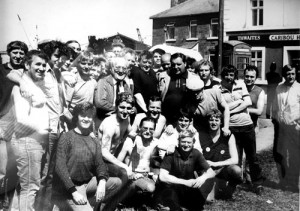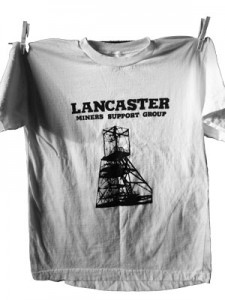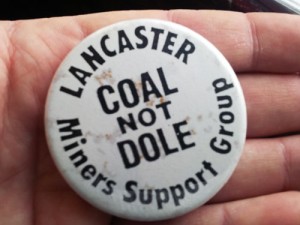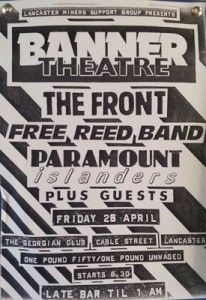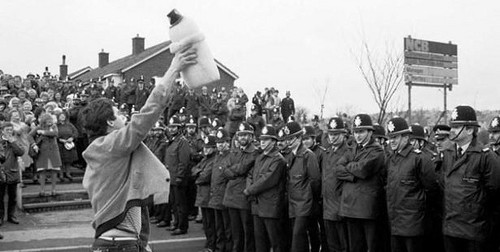
The Miners’ Strike of 1984-5 was an event of huge national significance that also affected Lancaster and the surrounding area. Lancaster citizens formed both a Miners Support Group and hosted a summer camp for the children of Northumberland mining families. Locals also played host to miners who came to Lancaster to picket the neighbouring port of Glasson Dock through which coal was being imported.
Lancaster and the Miners’ Strike 1984-5
Posted by Peter Yeandle, Lancaster
The Miners’ Strike of 1984-5 was a pivotal moment in modern British history. Much has been written about the Strike, but the majority of texts focus on the coalfields themselves. What has become clear from research, however, is that events in Lancaster are of national significance.
With the exception of the essay listed in the bibliography written by Eric and Margaret Jones, with John King, I have been unable to find any detailed accounts of what happened in Lancaster in these crucial years. Lancaster witnessed confrontations between pickets and police. Local citizens supported miners – not only fundraising and playing host to miners who travelled to Lancaster to picket at Glasson Dock, but also running a summer camp for the children of mining families. Some miners remained in Lancaster and still live here. The Miners’ Strike, I hope to show, is not only a key part of modern British history but the modern history of Lancaster itself.
Glasson Dock
While the strikes were being carried out in coalmining regions, the government was importing coal from northern Europe through small ports. One such port was Glasson Dock, through which several thousand tons of coal per week was estimated to be arriving. In April 1984, men from the Ferrymoor Riddings colliery in Yorkshire joined with local students and members of the Socialist Workers Party to picket the dock. In May, pickets from Bates pit in Blyth arrived. Before this, the police had easily outnumbered protesters. But, now, the small port a few miles south of Lancaster, was witness to a series of skirmishes. The local Conservative MP, Elaine Kellett-Bowman, was so worried about the number of demonstrators that she raised the issue in a debate in Parliament.
The local press was unsure how to report the arrival of hundreds of miners: letters were published which both supported and opposed the pickets. Animosity towards the pickets reached a crescendo when, at the end of May, a stone was thrown at the driver of a lorry carrying coal and the driver was seriously injured. Local support, however, continued unabated. £200 was raised for the strike fund from donations by workers at Heysham power station. The reputation of miners was probably enhanced because of their offer to assist in the rescue of people trapped by the explosion of the gas works in Abbeystead (in which 15 people died).
The Miners’ Strike is not only a key part of modern British history but the modern history of Lancaster itself.
Support for the Miners
Support was shown in a number of ways. The Lancaster Miners Support Group was established in November 1984 and quickly set to work seeking donations from local businesses. Tee shirts were printed and badges made up.
Local families hosted miners in their homes. The Trades Club, which was on Fenton Street, served as headquarters not only for fundraising activities but the collection of food to send to mining families. Collections were held weekly at Horseshoe Corner in the town centre, at the Arndale Centre in Morecambe and at the Coop Food Store. The University had its own support group.
The Christmas campaign of 1984 collected not only money, but food, toys and other gifts. Members of the Support Group toured the pubs of Lancaster on Friday evenings in December, raising between £40 and £100 pounds an evening.
A series of fundraising gigs were organised. The posters, some of which are reproduced here, show adverts for gigs in the Gregson Institute (now the Gregson Centre), the Georgian Club (was on Phoenix Street), the Sugar House (student night club) and the Yorkshire House.
The Support Group also organised coach travel to support pickets elsewhere in the region, such as at Padiham Power Station, and in Burnley, Preston and St Helens.
When speaking with people who lived in Lancaster in the 1980s, the most common story I have been told, is of the summer camp organised for the children of mining families.
Summer Camp
Once the demonstrations at Glasson Dock had quietened down, and many miners had returned home, Lancaster citizens debated what they could do to offer further support. This was before the Support Group had been formed. The decision was reached to hold a summer camp for children in order to boost morale of the miners.
The Lancaster Social Education Summer Project was launched in June 1984 and 75 children from Blyth, Northumberland, came to Lancaster in weekly groups of 15 across late July and August 1984. Over £2,500 of funds were raised and various activities were organised. Camping at Gibraltar Farm in Silverdale was made possible by the donation of four large tents by the hiking club at the University. Trips to Morecambe funfair and the Lake District were facilitated by cash and food donations from local businesses and individuals. Swimming and water sports activities at Carnforth swimming pool were enabled by staff giving up their time for free to open the pool an hour early. These are but a few examples.
All in all, I was surprised to discover that Lancaster had played such a prominent role in the miners’ strike. Lancaster may not have been the site of those coalfield battles impressed upon memories of 1984-5, but – at Glasson Dock – it was witness to confrontations with the police. The people of Lancaster had donated time, money, energy and solidarity to the miners and their families. It was a key moment in Lancaster’s modern history of political dissent.
- “Coal Industry Dispute”, 25 April 1984. House of Commons debate. http://hansard.millbanksystems.com/commons/1984/apr/25/coal-industry-dispute#S6CV0058P0_19840425_HOC_156
- Eric Jones, Margaret Jones and John King, ‘“It’s Our Fight too!” Solidarity and Support in Lancaster during the Miners Strike of 1984-5’, North West Labour History, no. 11 (1985/6)
- Donald MacIntyre, ‘How the Miners’ Strike of 1984-5 changed Britain forever’, New Statesman 16 June 2014. http://www.newstatesman.com/politics/2014/06/how-miners-strike-1984-85-changed-britain-ever
- Seumas Milne, The Enemy Within: the Secret War against the Miners (London: Verso, 1994).
- Jonathan and Ruth Winterton, Coal, Crisis and Conflict: the 1984-5 Miners’ Strike in Yorkshire (Manchester: Manchester University Press, 1989)


